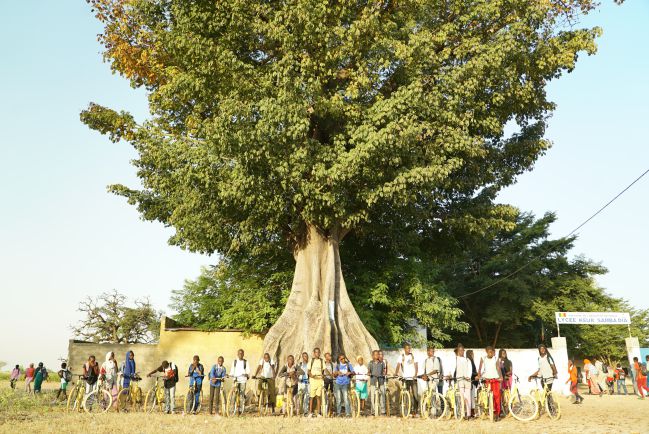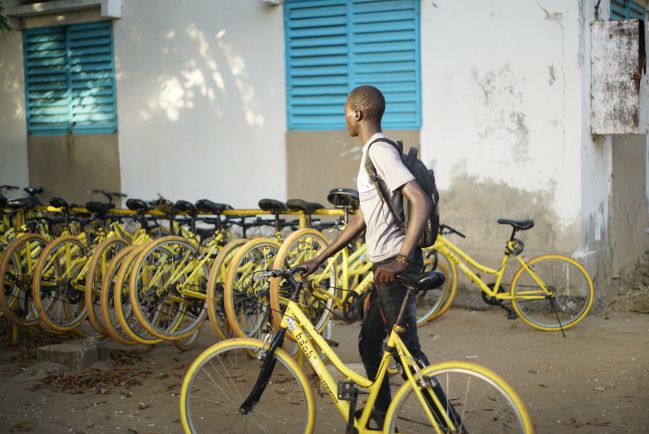By
Abdou, Abdou, to the school (to school)”. It is 6:45 in a small town in rural Senegal. Abdou, who wears glasses due to minor vision problems, is woken up by his family. He has a long way to school on foot. Get dressed, a little protective cream and, almost at night, he begins his journey after meeting other companions at 7 o’clock. Class starts at 8. Before, it has a distance of kilometers walking. Well, I had. Now, he makes that journey faster and more efficiently: by bicycle.
In recent years, Bicycles Without Borders (BSF), an NGO that has been in Senegal since 2015 (its global beginnings were in 2013), It changed the course and education of hundreds of children in the African country. In this way, a large part of the students would have a bicycle (known as a baobike) to be able to go to school, which reduces time, fatigue and increases, as the grades show, performance in the classroom. There are students who have to walk 10 kilometers every morning, and another 10 in the afternoon, to get to and from school. With a bicycle for it, everything changed.

Enlarge
Students pose with their bicycles in front of the Lycée de Samba Dia before entering class
Javier San Martin
“It is a tool that facilitates learning and reduces school absenteeism. There are currently around 1,500 bicycles in circulation in nine different schools in this Senegalese area. It costs each student 6,000 cefas for the entire course (about 9 euros) while private transport, such as bus, is 15,000… per month (23 euros). It is a country that invests and believes in education, but does not have the mobility solution to carry it out”explains Romà Boulé, a Catalan founder of the NGO and great promoter of this pioneering project.
“Abdou is a great student, in the future he wants to continue his life and work in Senegal,” explains Ismaïla Cisse, his uncle. Palmarin (where the main bicycle warehouse is), Samba Dia… are areas that have the sea just a few meters away, and that is why Cisse highlights that his nephew wants to work in the country, because there are some who don’t think the same.
The departure of nocturnal boats is frequent and there are many little ones who risk their lives. Also the use of the bicycle, to continue with schooling, helps reduce these events. “I have students who have left on a boat. Even in some cases it was at the request of her parents. I keep in touch with several. Others died. Of those who arrived, some do not send me photos of the conditions in which they live out of shame. We are in Senegal, a very difficult country due to living conditions, but it is good that you are here (ACE) so that people can see reality. “I am sure that education is the fundamental part of a better future and bicycles have had a positive influence on it,” says Ngourane Guisse, Spanish teacher, one of the elective subjects most requested by young Senegalese students.
“In addition, mentalities are changing and the number of girls in schools is increasing.”Guisse points out about equality between men and women at educational levels. With the project established in Senegal, recognized by the population and even with the knowledge of the Government, who were informed by this initiative, Romà and his colleagues have key local people for the operation of the NGO such as Anne Marie and Diop Tamsirtwo fundamental figures.
In the case of the first, He lived the entire Bicycles Without Borders process up close. First, using it to be able to go to school, when before he had to get up at 5 in the morning to walk two hours to the classrooms. After a short break, since she became a mother at the age of 16, she resumed her studies. “I love this project,” says the Senegalese, who in 2015 was at that first delivery of bicycles, when the direction that the NGO and the initiative would take was a mystery.
Now, looking at it with perspective, the result is great. Years ago, Anna Marie did various surveys in the area about Bicycles Without Borderssince he found that people knew about the project, but not many of the details, its operation… After finishing his university years, he returned to be part of BSF: “I am very happy and I would like to make other students follow this path, because I have no doubt that the bicycle is the way.”

Enlarge
A student leaves his bicycle in the parking spaces that each school has while they are in the classrooms
Javier San Martin
Tamsir, who observes the large number of yellow bicycles around him, takes stock of what he has experienced so far and what is to come: “When the project started years ago, some did not believe that they would succeed. I do. And we are experiencing it: absenteeism is reduced, students do not arrive late, they do so more rested. Before there were about five bicycles here, now there are hundreds. Together, with Romà and Inés (another important person) we have overcome all the difficulties with work. The development of education in Africa is essential. “The students realized a long time ago that the bicycle changes their lives.”
Baobikes, being all the same, They have easy replacement of components that may be damaged, and each school has a small workshop for these breakdowns. Alima Cisse, director of the Samba Dia school, gets up in her office, opens the closet and takes out the notes of the students who use bicycles to go to school. The improvement in recent years is spectacular and she is proud. “You can’t imagine the good that the bicycle does for us. It is not a game, it is a fundamental tool.” In rural areas of the country, the literacy rate is lower… but every year that percentage is growing.
With a course that lasts from October to June or July, with days of more than 40 degrees in the sun, with the desire to learn… BSF is taking a giant step through two wheels in Senegal. “If you look closely, there is always a good vibe on the bike. It works for everything. Or do you see people angry about it? And this does not end here. We want to be in more places, give away our knowledge, the methodology… everything that improves the conditions of the students”, concludes Romà. A bicycle that changes a life. (Collaborate with the Bicycles for Education program of Bicicletas Sin Fronteras. Send BIZUM to 07607. More information at www.bicicletassinfronteras.org).
Prominence in La Vuelta
In the last edition of La Vuelta, Bicicletas Sin Fronteras was present every day with the solidarity jersey. A jury made up of AS, SER and La Vuelta After each stage they decided the cyclist who was most supportive of helping colleagues, the way they treated the fans… Runners like Jonas Vingegaard, Sepp Kuss, Primoz Roglic, Mikel Landa and Geraint Thomas They wore a garment that came to cycling to stay.
